高考英语语法之倒装句型课件(51张ppt)
文档属性
| 名称 | 高考英语语法之倒装句型课件(51张ppt) |  | |
| 格式 | pptx | ||
| 文件大小 | 3.5MB | ||
| 资源类型 | 教案 | ||
| 版本资源 | 牛津译林版(2019) | ||
| 科目 | 英语 | ||
| 更新时间 | 2021-08-06 09:06:02 | ||
图片预览


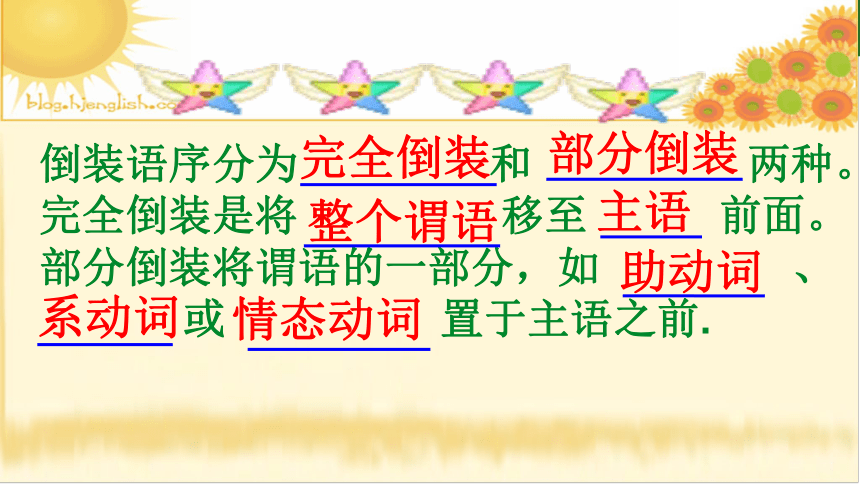

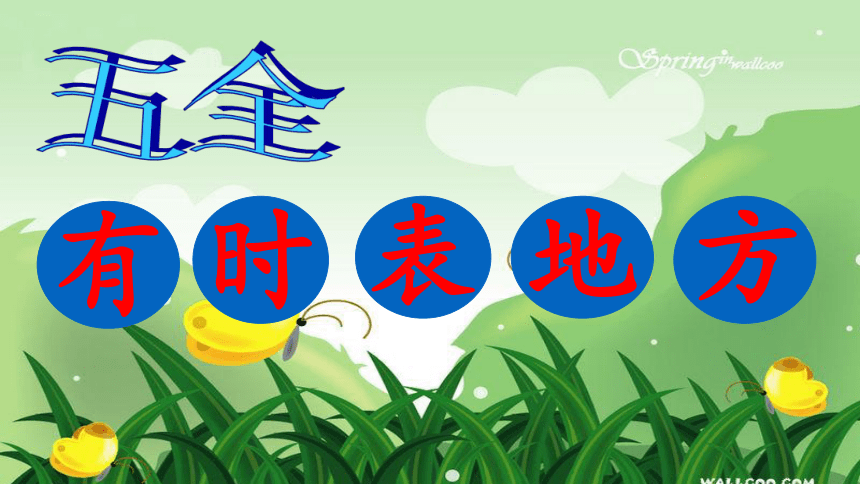
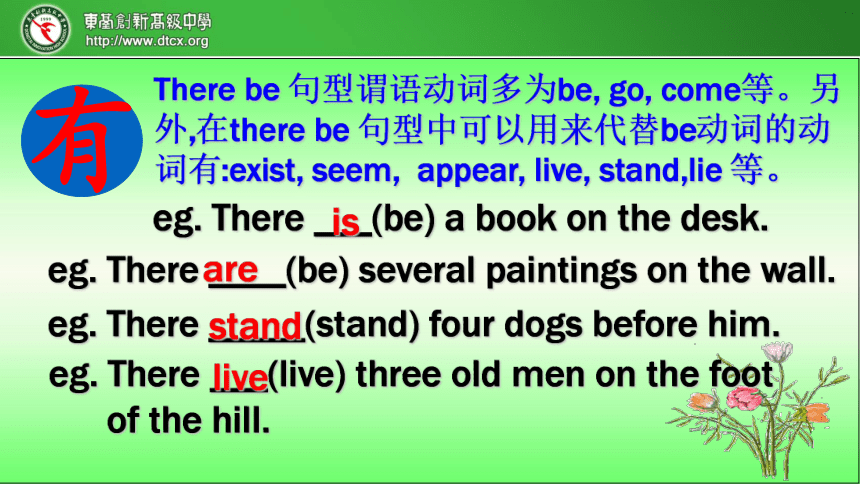
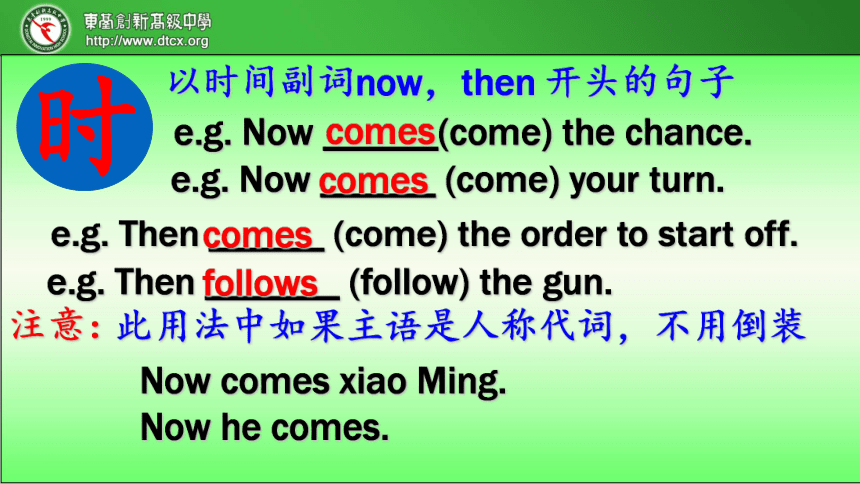
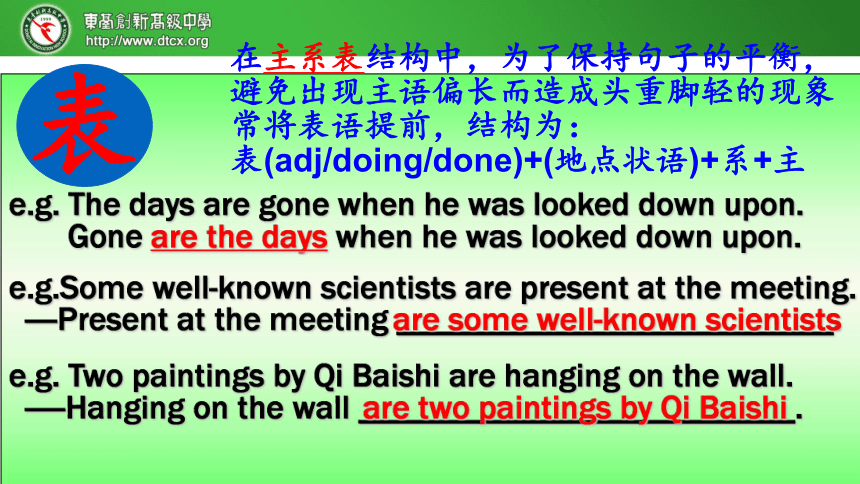
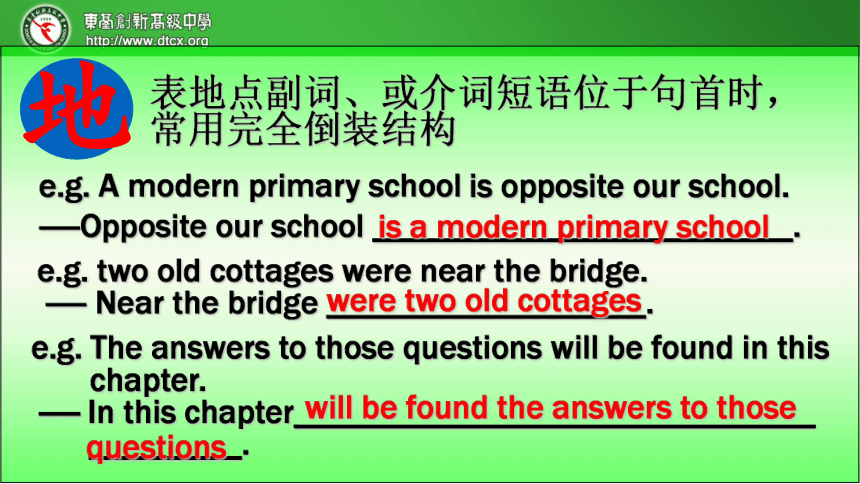
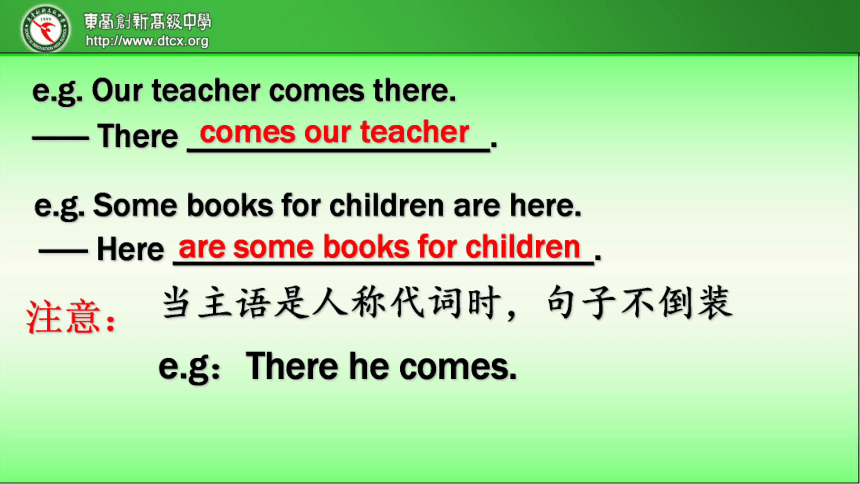
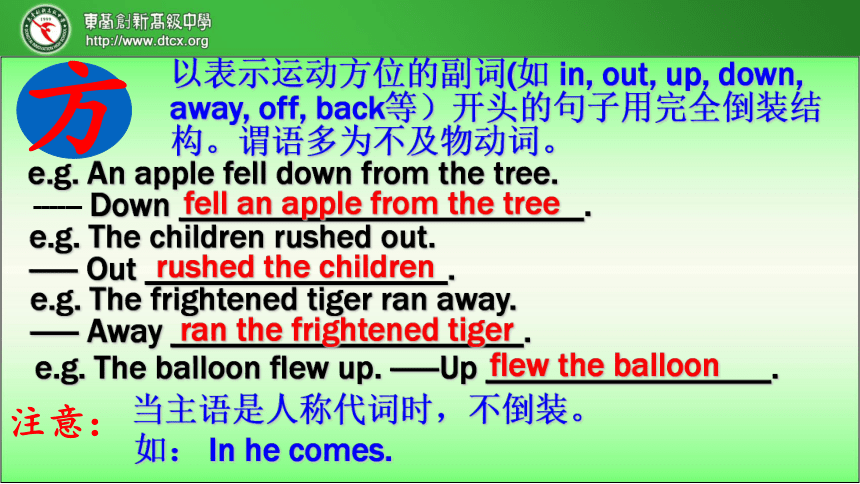
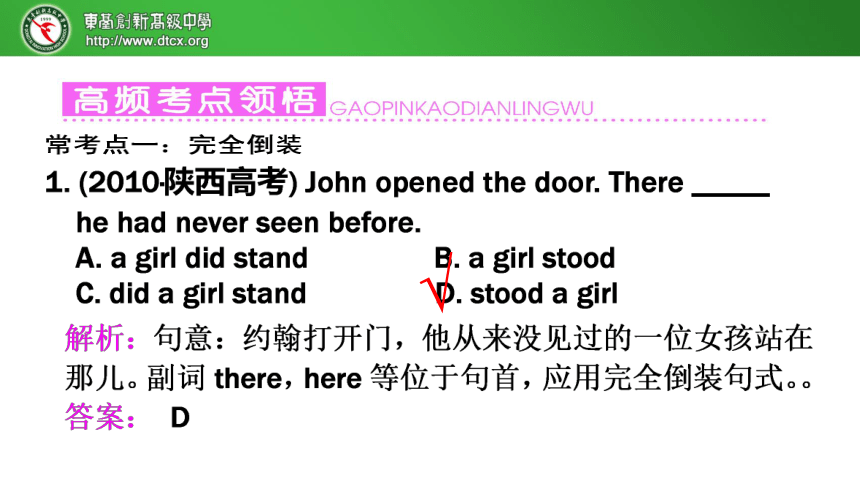
文档简介
Welcome!
Module 10Unit 2
Reading (1)
倒装句
英语句子按主谓排列顺序来分有正常语序和倒装语序。
正常语序的结构是
主语+谓语
倒装语序分为 和 两种。
完全倒装是将 移至 前面。
部分倒装将谓语的一部分,如 、
或 置于主语之前.
整个谓语
主语
助动词
系动词
情态动词
完全倒装
部分倒装
顺口溜
五全
八部
话
倒
装
五全
有
时
表
地
方
有
There be 句型谓语动词多为be, go, come等。另外,在there be 句型中可以用来代替be动词的动词有:exist, seem, appear, live, stand,lie 等。
eg. There ___(be) a book on the desk.
eg. There ____(be) several paintings on the wall.
is
are
eg. There _____(stand) four dogs before him.
stand
eg. There ___(live) three old men on the foot
of the hill.
live
时
以时间副词now,then 开头的句子
e.g. Now ______(come) the chance.
e.g. Now ______ (come) your turn.
e.g. Then ______ (come) the order to start off.
e.g. Then _______ (follow) the gun.
注意:
此用法中如果主语是人称代词,不用倒装
Now comes xiao Ming.
Now he comes.
comes
comes
comes
follows
表
在主系表结构中,为了保持句子的平衡,
避免出现主语偏长而造成头重脚轻的现象
常将表语提前,结构为:
表(adj/doing/done)+(地点状语)+系+主
e.g. The days are gone when he was looked down upon.
Gone are the days when he was looked down upon.
e.g.Some well-known scientists are present at the meeting.
----Present at the meeting __________________________.
e.g. Two paintings by Qi Baishi are hanging on the wall.
-----Hanging on the wall __________________________.
are some well-known scientists
are two paintings by Qi Baishi
地
表地点副词、或介词短语位于句首时,常用完全倒装结构
e.g. A modern primary school is opposite our school.
-----Opposite our school _________________________.
e.g. two old cottages were near the bridge.
----- Near the bridge ___________________.
e.g. The answers to those questions will be found in this
chapter.
----- In this chapter_______________________________
_________.
is a modern primary school
were two old cottages
will be found the answers to those
questions
e.g. Some books for children are here.
------ Here _________________________.
e.g. Our teacher comes there.
------- There __________________.
注意:
当主语是人称代词时,句子不倒装
e.g:There he comes.
comes our teacher
are some books for children
方
以表示运动方位的副词(如 in, out, up, down,
away, off, back等)开头的句子用完全倒装结
构。谓语多为不及物动词。
e.g. An apple fell down from the tree.
------ Down ________________________.
e.g. The children rushed out.
------ Out __________________.
e.g. The frightened tiger ran away.
------ Away _____________________.
e.g. The balloon flew up. ------Up _________________.
注意:
当主语是人称代词时,不倒装。
如: In he comes.
fell an apple from the tree
rushed the children
ran the frightened tiger
flew the balloon
√
2. For a moment nothing happened. Then _____ all
shouting together.
A. voices had come B. came voices
C. voices would come D. did voices come
3. I’m glad to find that on top of the mountain _____
from the time of the Rome Empire.
A. lies ancient ruins B. lie ancient ruins
C. does ancient ruins lie D. do ancient ruins lie
4. ____ to the gift was a note on which he expressed
his appreciation for our reception during his stay here.
A. Being attached B. Attached
C. Attaching D. Having attached
√
√
√
不
只
让步
也
常
八部
虚
祝福
如此
不
含有否定意义的副词,介词短语,连词固定搭配位于句首时用部分倒装。
1.常见的否定意义的副词有: seldom, never, barely,
rarely, little, hardly, nowhere, no longer, no more,
2.否定意义的介词短语有:at no time; by no means; in no way; in no case; on no account; on no condition; under no circumstances (决不),
3. 否定意义的连词及固定搭配有:not until,
not only…but also, no sooner… than,
Hardly/scarcely… when等
have I heard such a thing.
e.g. He seldom goes to he film.
will he come back.
e.g. I have never heard such a thing.
Never
does he go to he film.
Seldom
e.g. He will at no time come back.
At no time
eg. He Not only did work faster, but also he worked better.
not only…but also…连接的是并列主语时,不倒装.如:
Not only Jack but also Mary is my friend.
Not only I but also she likes English.
e.g. He not only likes English, but also he learns it well.
------ Not only __________ English, but also he learns it well.
注意:
Not only …but also连接的句子
----Not only ______work faster, but also he worked better.
did he
does he like
did I learn anything.
did he go to bed.
Not until 引导的成分位于句首
e.g. I did not learn anything until yesterday.
Not until yesterday
e.g. He did not go to bed until his mother
came back did.
Not until his mother came back
Hardly…when /no sooner…than引导的句子
e.g. The?game had hardly ?began?when?it?started?raining.
------- Hardly ___________________?when?it?started?raining.
e.g. The thief had no sooner seen the policeman than he
ran away.
------- No sooner _____________________________ than he
ran away.
特别提醒
此结构中,要特别注意主句和从句的时
态。主句用过去完成时,从句用过去时。
had the?game?began
had the thief seen the policeman
只
Only 与其所修饰副词,介词短语或状语从句放在句首时。
e.g. He realized the importance of English only then.
------ Only then _____________the importance of English
e.g. You can learn English well only in this way.
------ Only in this way _____________English well.
e.g. He was able to get back to work only when the war
was over.
----- Only when the war was over _______ able to get back
to work.
did he realize
can you learn
was he
让步
as引导让步状语从句时,用倒装语序,即把作状
语的副词或作表语的形容词或名词提前,而且
如果作表语的是单数名词,前面不加冠词,也
可以把谓语动词部分的实义动词提前。结构如下:
形容词/副词
名词(不带冠词) +as /though +主语+谓语, 主句。
动词
e.g. Hard _________ he works, he can’t catch up
with his classmates.
e.g. Smart _________ she is, she doesn’t study
hard.
e.g. Child __________he is, he knows a lot.
e.g. Try _________ you will, you won’t be able to
persuade him.
as/though
as/though
as/though
as/though
although引导让步状语从句时不能倒装,though引
导让步状语从句时可以倒装 也可以不倒装, as引导让步状语从句时必须倒装。
尽管他是个孩子,但他知道的很多。
Although he is a child, he knows a lot.
____________________ he is a child, he knows a lot.
Child __________ he is , he knows a lot.
注意:
as/though
Though/Although/While
也
so/neither/nor位于句首表示前面所说的情况也
适合后者或一者具备两种情况。其句型为:
“ so/neither/nor+谓语(系动词/助动词/情态动词)
+主语”,so表示肯定意义,neither/nor表示否定
意义
She has finished her homework. _________________.
她已经完成了作业,她弟弟也做完了。
她是老师,她母亲也是。
She is a teacher. ______________.
So is her mother
So has her brother
我从未出过国,他也没出过。
I’ve never been abroad. _______________.
昨晚我没去看电影,他也没去。
I didn’t go to the cinema last night, _________
你会骑自行车,我也会。
You can ride a bike. _______.
So can I
Neither has he
nor did he.
注意:
如果后一句内容只是对前面内容加以肯定或
同意。则不用倒装。
其句型为“so +主语+谓语(系动词/助动词/情态动词)”
(此时so等于indeed)
试比较:
A: I’m beautiful.
B: So am I.
C: So you are.
It was cold yesterday.
So it was.
C. So is it today.
(昨天的确很冷。)
(今天也冷。)
我也漂亮
你的确漂亮
相关链接
当前面的两件事或两件以上的事也适合于另一人或物时,通常不用“So/Neither/Nor……”而使用“So it is with….” 或“It is the same with….” 如:
e.g. Tom likes singing, but he doesn’t like dancing.
So it is with Mary.
= It is the same with Mary.
e.g. John is clever and he studies hard.
So it is with Lucy.
= It is the same with Mary.
常
在以often, always, many a time,now and then,
every other day 等表示频度的副词及短语放在
句首时,也可用倒装结构. 如:
e.g. She always asks me for money.
does she ask me for money.
e.g. We often warned them not to do so.
did we warn them not to do so.
Always
Often
用于省略if的虚拟条件句中。
虚
与现在事实
相反
与过去事实
相反
与将来事实
相反
Ved
If+主语 + (be动词
用were)
If+主语+ had done
Ved
If+主语 + were to do
should + V
主语+should/would/could
might +V原形
主语+should/would/could
might+have done
主语+should/would/could
might +V原形
从句
主句
当从句的谓语动词中有were/should/had 等,可将if省略,将were/should/had提到主语之前.
e.g. If I had worked hard, I would have succeeded.
------ ____ worked hard, I would have succeeded.
e.g. If I were a bird, I would fly in the sky.
_____ a bird, I would fly in the sky.
Were I
Had I
e.g. If time were to go back, I would work double
hard.
------ ________ to go back, I would work
double hard.
e.g. If it should be fine tomorrow,
we would go for an outing.
_______ be fine tomorrow,
we would go for an outing.
Were time
Should it
如此
在so/such…..that…..句式中,如果so 或 such及其
所修饰的部分位于句首时用倒装。如:
e.g. He was so angry that he couldn’t speak.
was he that he couldn’t speak.
e.g. He ran so fast that we couldn’t catch up with him.
did he run that we couldn’t catch up with him.
So angry
So fast
e.g. He has made such rapid progress that we are all
proud of him.
has he made that
e.g. He is such a good boy that we all like him.
is he that we all like him.
注意:
So/Such 连同它所修饰的部分位于句首主句部分倒装,that以引导的从句不倒装
Such rapid progress
we are all proud of him.
Such a good boy
祝福
倒装可用于表祝愿的句子中:
May you+动词原形! 祝你……!
Long live…! ……万岁!
e.g. May you succeed!
e.g. Long live China!
e.g. Long live our friendship!
√
√
√
√
√
√
√
√
√
√
√
√
√
√
上一流大学的梦想深深地吸引着我们。只有这个时候,我们才意识到努力学习的重要性。现在我们已经下定决心全身心地投入学习,只有这样,我们才能实现自己的梦想!
Translate the short passage into English
The dream of going to the first-class university attracts us greatly. Only then do we realize the importance of study hard. Now have we made up our minds to devote to study, only in this way can we realize our dreams.
Translate the short passage into English
Module 10Unit 2
Reading (1)
倒装句
英语句子按主谓排列顺序来分有正常语序和倒装语序。
正常语序的结构是
主语+谓语
倒装语序分为 和 两种。
完全倒装是将 移至 前面。
部分倒装将谓语的一部分,如 、
或 置于主语之前.
整个谓语
主语
助动词
系动词
情态动词
完全倒装
部分倒装
顺口溜
五全
八部
话
倒
装
五全
有
时
表
地
方
有
There be 句型谓语动词多为be, go, come等。另外,在there be 句型中可以用来代替be动词的动词有:exist, seem, appear, live, stand,lie 等。
eg. There ___(be) a book on the desk.
eg. There ____(be) several paintings on the wall.
is
are
eg. There _____(stand) four dogs before him.
stand
eg. There ___(live) three old men on the foot
of the hill.
live
时
以时间副词now,then 开头的句子
e.g. Now ______(come) the chance.
e.g. Now ______ (come) your turn.
e.g. Then ______ (come) the order to start off.
e.g. Then _______ (follow) the gun.
注意:
此用法中如果主语是人称代词,不用倒装
Now comes xiao Ming.
Now he comes.
comes
comes
comes
follows
表
在主系表结构中,为了保持句子的平衡,
避免出现主语偏长而造成头重脚轻的现象
常将表语提前,结构为:
表(adj/doing/done)+(地点状语)+系+主
e.g. The days are gone when he was looked down upon.
Gone are the days when he was looked down upon.
e.g.Some well-known scientists are present at the meeting.
----Present at the meeting __________________________.
e.g. Two paintings by Qi Baishi are hanging on the wall.
-----Hanging on the wall __________________________.
are some well-known scientists
are two paintings by Qi Baishi
地
表地点副词、或介词短语位于句首时,常用完全倒装结构
e.g. A modern primary school is opposite our school.
-----Opposite our school _________________________.
e.g. two old cottages were near the bridge.
----- Near the bridge ___________________.
e.g. The answers to those questions will be found in this
chapter.
----- In this chapter_______________________________
_________.
is a modern primary school
were two old cottages
will be found the answers to those
questions
e.g. Some books for children are here.
------ Here _________________________.
e.g. Our teacher comes there.
------- There __________________.
注意:
当主语是人称代词时,句子不倒装
e.g:There he comes.
comes our teacher
are some books for children
方
以表示运动方位的副词(如 in, out, up, down,
away, off, back等)开头的句子用完全倒装结
构。谓语多为不及物动词。
e.g. An apple fell down from the tree.
------ Down ________________________.
e.g. The children rushed out.
------ Out __________________.
e.g. The frightened tiger ran away.
------ Away _____________________.
e.g. The balloon flew up. ------Up _________________.
注意:
当主语是人称代词时,不倒装。
如: In he comes.
fell an apple from the tree
rushed the children
ran the frightened tiger
flew the balloon
√
2. For a moment nothing happened. Then _____ all
shouting together.
A. voices had come B. came voices
C. voices would come D. did voices come
3. I’m glad to find that on top of the mountain _____
from the time of the Rome Empire.
A. lies ancient ruins B. lie ancient ruins
C. does ancient ruins lie D. do ancient ruins lie
4. ____ to the gift was a note on which he expressed
his appreciation for our reception during his stay here.
A. Being attached B. Attached
C. Attaching D. Having attached
√
√
√
不
只
让步
也
常
八部
虚
祝福
如此
不
含有否定意义的副词,介词短语,连词固定搭配位于句首时用部分倒装。
1.常见的否定意义的副词有: seldom, never, barely,
rarely, little, hardly, nowhere, no longer, no more,
2.否定意义的介词短语有:at no time; by no means; in no way; in no case; on no account; on no condition; under no circumstances (决不),
3. 否定意义的连词及固定搭配有:not until,
not only…but also, no sooner… than,
Hardly/scarcely… when等
have I heard such a thing.
e.g. He seldom goes to he film.
will he come back.
e.g. I have never heard such a thing.
Never
does he go to he film.
Seldom
e.g. He will at no time come back.
At no time
eg. He Not only did work faster, but also he worked better.
not only…but also…连接的是并列主语时,不倒装.如:
Not only Jack but also Mary is my friend.
Not only I but also she likes English.
e.g. He not only likes English, but also he learns it well.
------ Not only __________ English, but also he learns it well.
注意:
Not only …but also连接的句子
----Not only ______work faster, but also he worked better.
did he
does he like
did I learn anything.
did he go to bed.
Not until 引导的成分位于句首
e.g. I did not learn anything until yesterday.
Not until yesterday
e.g. He did not go to bed until his mother
came back did.
Not until his mother came back
Hardly…when /no sooner…than引导的句子
e.g. The?game had hardly ?began?when?it?started?raining.
------- Hardly ___________________?when?it?started?raining.
e.g. The thief had no sooner seen the policeman than he
ran away.
------- No sooner _____________________________ than he
ran away.
特别提醒
此结构中,要特别注意主句和从句的时
态。主句用过去完成时,从句用过去时。
had the?game?began
had the thief seen the policeman
只
Only 与其所修饰副词,介词短语或状语从句放在句首时。
e.g. He realized the importance of English only then.
------ Only then _____________the importance of English
e.g. You can learn English well only in this way.
------ Only in this way _____________English well.
e.g. He was able to get back to work only when the war
was over.
----- Only when the war was over _______ able to get back
to work.
did he realize
can you learn
was he
让步
as引导让步状语从句时,用倒装语序,即把作状
语的副词或作表语的形容词或名词提前,而且
如果作表语的是单数名词,前面不加冠词,也
可以把谓语动词部分的实义动词提前。结构如下:
形容词/副词
名词(不带冠词) +as /though +主语+谓语, 主句。
动词
e.g. Hard _________ he works, he can’t catch up
with his classmates.
e.g. Smart _________ she is, she doesn’t study
hard.
e.g. Child __________he is, he knows a lot.
e.g. Try _________ you will, you won’t be able to
persuade him.
as/though
as/though
as/though
as/though
although引导让步状语从句时不能倒装,though引
导让步状语从句时可以倒装 也可以不倒装, as引导让步状语从句时必须倒装。
尽管他是个孩子,但他知道的很多。
Although he is a child, he knows a lot.
____________________ he is a child, he knows a lot.
Child __________ he is , he knows a lot.
注意:
as/though
Though/Although/While
也
so/neither/nor位于句首表示前面所说的情况也
适合后者或一者具备两种情况。其句型为:
“ so/neither/nor+谓语(系动词/助动词/情态动词)
+主语”,so表示肯定意义,neither/nor表示否定
意义
She has finished her homework. _________________.
她已经完成了作业,她弟弟也做完了。
她是老师,她母亲也是。
She is a teacher. ______________.
So is her mother
So has her brother
我从未出过国,他也没出过。
I’ve never been abroad. _______________.
昨晚我没去看电影,他也没去。
I didn’t go to the cinema last night, _________
你会骑自行车,我也会。
You can ride a bike. _______.
So can I
Neither has he
nor did he.
注意:
如果后一句内容只是对前面内容加以肯定或
同意。则不用倒装。
其句型为“so +主语+谓语(系动词/助动词/情态动词)”
(此时so等于indeed)
试比较:
A: I’m beautiful.
B: So am I.
C: So you are.
It was cold yesterday.
So it was.
C. So is it today.
(昨天的确很冷。)
(今天也冷。)
我也漂亮
你的确漂亮
相关链接
当前面的两件事或两件以上的事也适合于另一人或物时,通常不用“So/Neither/Nor……”而使用“So it is with….” 或“It is the same with….” 如:
e.g. Tom likes singing, but he doesn’t like dancing.
So it is with Mary.
= It is the same with Mary.
e.g. John is clever and he studies hard.
So it is with Lucy.
= It is the same with Mary.
常
在以often, always, many a time,now and then,
every other day 等表示频度的副词及短语放在
句首时,也可用倒装结构. 如:
e.g. She always asks me for money.
does she ask me for money.
e.g. We often warned them not to do so.
did we warn them not to do so.
Always
Often
用于省略if的虚拟条件句中。
虚
与现在事实
相反
与过去事实
相反
与将来事实
相反
Ved
If+主语 + (be动词
用were)
If+主语+ had done
Ved
If+主语 + were to do
should + V
主语+should/would/could
might +V原形
主语+should/would/could
might+have done
主语+should/would/could
might +V原形
从句
主句
当从句的谓语动词中有were/should/had 等,可将if省略,将were/should/had提到主语之前.
e.g. If I had worked hard, I would have succeeded.
------ ____ worked hard, I would have succeeded.
e.g. If I were a bird, I would fly in the sky.
_____ a bird, I would fly in the sky.
Were I
Had I
e.g. If time were to go back, I would work double
hard.
------ ________ to go back, I would work
double hard.
e.g. If it should be fine tomorrow,
we would go for an outing.
_______ be fine tomorrow,
we would go for an outing.
Were time
Should it
如此
在so/such…..that…..句式中,如果so 或 such及其
所修饰的部分位于句首时用倒装。如:
e.g. He was so angry that he couldn’t speak.
was he that he couldn’t speak.
e.g. He ran so fast that we couldn’t catch up with him.
did he run that we couldn’t catch up with him.
So angry
So fast
e.g. He has made such rapid progress that we are all
proud of him.
has he made that
e.g. He is such a good boy that we all like him.
is he that we all like him.
注意:
So/Such 连同它所修饰的部分位于句首主句部分倒装,that以引导的从句不倒装
Such rapid progress
we are all proud of him.
Such a good boy
祝福
倒装可用于表祝愿的句子中:
May you+动词原形! 祝你……!
Long live…! ……万岁!
e.g. May you succeed!
e.g. Long live China!
e.g. Long live our friendship!
√
√
√
√
√
√
√
√
√
√
√
√
√
√
上一流大学的梦想深深地吸引着我们。只有这个时候,我们才意识到努力学习的重要性。现在我们已经下定决心全身心地投入学习,只有这样,我们才能实现自己的梦想!
Translate the short passage into English
The dream of going to the first-class university attracts us greatly. Only then do we realize the importance of study hard. Now have we made up our minds to devote to study, only in this way can we realize our dreams.
Translate the short passage into English
